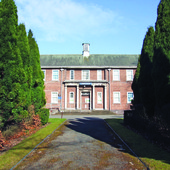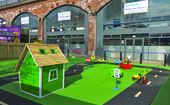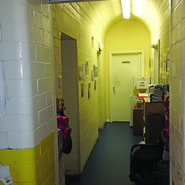
The Government wants to hack away at some of the red tape the early years sector faces when applying for planning permission to set up new nurseries.
The move is part of its early years expansion agenda, outlined in the report More Affordable Childcare, and will mean those wanting to convert pubs, police stations, hotels, offices, leisure centres and care homes into nurseries will no longer have to apply to change the building’s use or for full planning permission.
The Government is currently consulting on the plans, which could come into force from next April.
Those nursery owners who have already converted more unusual buildings into early years settings have welcomed the move.
Danielle Dixon is owner of the Yorkshire nursery chain Kinder Haven, which last month opened its fifth nursery in a former pub. All of its sites are based in former pubs and churches.
She says it currently takes between two and four months to gain planning permission involving a change of use, adding that ‘I would welcome anything that makes the planning process less burdensome.’
However, she urges caution and says that even without this red tape nursery owners still need to ensure plans for conversion are sensible.
‘It should not be a case of saying “Here’s a building – let’s try to put as many children in it as possible”. It has to be something suitable. This change shouldn’t be abused,’ she says.
Former pubs are particularly good buildings for nurseries, says Ms Dixon, as they often have large ground floor space – which helps to meet fire safety regulations – as well as outside spaces and car parking. They are also usually in residential areas, which makes them easy for parents to access.
There are plenty of empty pubs around. According to the Campaign for Real Ale, around 26 pubs are closing each week this year; around 10,000 have shut in the past decade.
Others to see the potential of former pubs as nurseries are Marjorie and David Jack, owners of Wirral and Merseyside chain Jack and Jill Day Nurseries.
Last month they were handed planning permission, including change of use, to convert Upton’s The Fender pub into a 56-place nursery.
The work is set to cost around £100,000 and includes a reduction of its 100-space car park to create green landscaping. The new nursery, which is set to open next summer, will also see the beer garden converted into a growing area as well as extensive internal building work.
Ms Jack says, ‘It’s in a wonderful location, near a large housing estate as well as right next to a train station and bus stop.’
Advice she offers other nursery owners considering such a move includes talking to local residents and councillors to avert any objections, which could delay the planning process.
‘Before we bought the pub, we talked to local residents about our plans and their response was wonderful. We didn’t have any objections; in fact, we had people writing in to say they wanted it, which you don’t normally get in planning applications,’ she says.
A NEW FEEL North West England-based Kids Planet is another chain to see the benefits of using less traditional buildings, having former doctors’ surgeries as well as a kitchen showroom among its premises.
North West England-based Kids Planet is another chain to see the benefits of using less traditional buildings, having former doctors’ surgeries as well as a kitchen showroom among its premises.
While chief executive Clare Roberts welcomes the latest move to relax planning rules for nurseries, she says savvy owners are already able to convert certain premises without applying for a change of use.
She points out that properties such as clinics, health centres, crèches, day centres, schools, art galleries, museums, libraries, halls, churches and law courts all have the same D1 classification of use as nurseries so can already be easily converted.
Kids Planet usually looks for D1 properties to convert, but for its latest expansion project – to convert a large Edwardian police station set in an acre of land in Salford – it has made an exception. From next July, the police station is set to open as a 140-place nursery, complete with rooftop play area and sensory garden.
Like many pubs, an increasing number of police stations are being left empty. In London, for example, 63 police stations have been earmarked for closure this year as officers move into ‘contact points’ in community buildings such as libraries.
When converting a property such as a police station, Ms Roberts says it is important to ‘take away its institutionalised feel but ensure you consider the character of the building’.
She says, ‘From the front, this police station will not look very different, but on the inside the aim is to create a nursery that looks brand new and purpose built.’
Ms Roberts adds that when scouting for premises, the best location can often be right under your nose.
‘One of our nurseries used to be my doctors’ surgery for ten years and another was the baby weighing clinic that I went to with my mum to get my younger brother weighed,’ she says. ‘The reception area in our converted doctors’ surgery is very much how I remember it,’ she adds.
DOING THE SUMS When Jill Johnson, managing director of Yorkshire’s Twinkles Nursery was looking for a Leeds city-centre location for a new setting, her husband saw potential in a group of railway arches opposite his workplace.
When Jill Johnson, managing director of Yorkshire’s Twinkles Nursery was looking for a Leeds city-centre location for a new setting, her husband saw potential in a group of railway arches opposite his workplace.
She agreed with him, bought the former Network Rail offices that occupy three of the arches and has created a nursery ‘in a brilliant location on the main artery loop in Leeds’.
She adds, ‘It is very bright and breezy and the location also has car parking and an area at the front for outdoor play. Parents wanted a nursery that was more in the city centre, so we also knew there was the demand.’
Keeping money aside for unexpected problems during conversion is the chief advice offered by Ms Johnson.
This was certainly a necessary approach for Twinkles during its conversion of a former squash court in Knaresborough into a nursery.
The work included creating a new floor across the middle of the court. Ms Johnson explains, ‘We then discovered that we needed to put special noise-proof flooring in, which was an extra £4,500. You need to do your figures in advance and have money set back for issues that arise. There is always something that crops up.’
But while the challenges of converting pubs, police stations and even sports venues into nurseries can seem daunting, the rewards can be huge, with those in the sector who have made the move now running some of the UK’s most ideally located and unusual nurseries.
CASE STUDY: FOOTSTEPS DAY NURSERY
 When Footsteps Day Nursery co-owner Jackie Sebury decided to convert a derelict former police station in the Welsh village of Llanbradach into a nursery in 2002, she wanted to retain its unusual history and character as well as create a modern early years setting.
When Footsteps Day Nursery co-owner Jackie Sebury decided to convert a derelict former police station in the Welsh village of Llanbradach into a nursery in 2002, she wanted to retain its unusual history and character as well as create a modern early years setting.
As a result, the cells were kept intact and are now used as rooms for staff, baby changing and a sleeping area for the younger children. Footsteps Day Nursery also has a former police exercise yard, which has been retained as a play area.
‘We looked at a range of buildings, office units and churches, but one day I was driving through Llanbradach and saw this old vandalised former police station, boarded up and with a car park. I thought it was perfect for a nursery,’ says Ms Sebury.
One of the challenges she faced was finding out who owned the property, but she eventually discovered a couple from nearby Caerphilly were looking to turn it into housing. After successfully buying it from them, Ms Sebury then had to apply for change of use, back from the residential status the couple had changed it to.
In terms of renovation work, Ms Sebury explains, ‘It was vandalised, had no electricity or water and the windows were smashed. But regarding structural work, I didn’t want to knock any walls through so not a lot of changes were needed.
‘I wanted lots of small personal rooms and that’s what it had. Also, it has very thick walls that I wanted to keep, so in the summer it’s lovely and cool and in the winter it’s really warm.’
During the four-month conversion, builders also uncovered some hidden criminal evidence from the past, found behind a pipe in one of the cells. ‘We found old money, newspapers and cheque books, presumably hidden by suspects there,’ she says.
She says parents and the local community have welcomed the work she’s done. ‘We also get some dads who come in and joke that they know the building well from when they got in trouble as boys,’ she adds.
